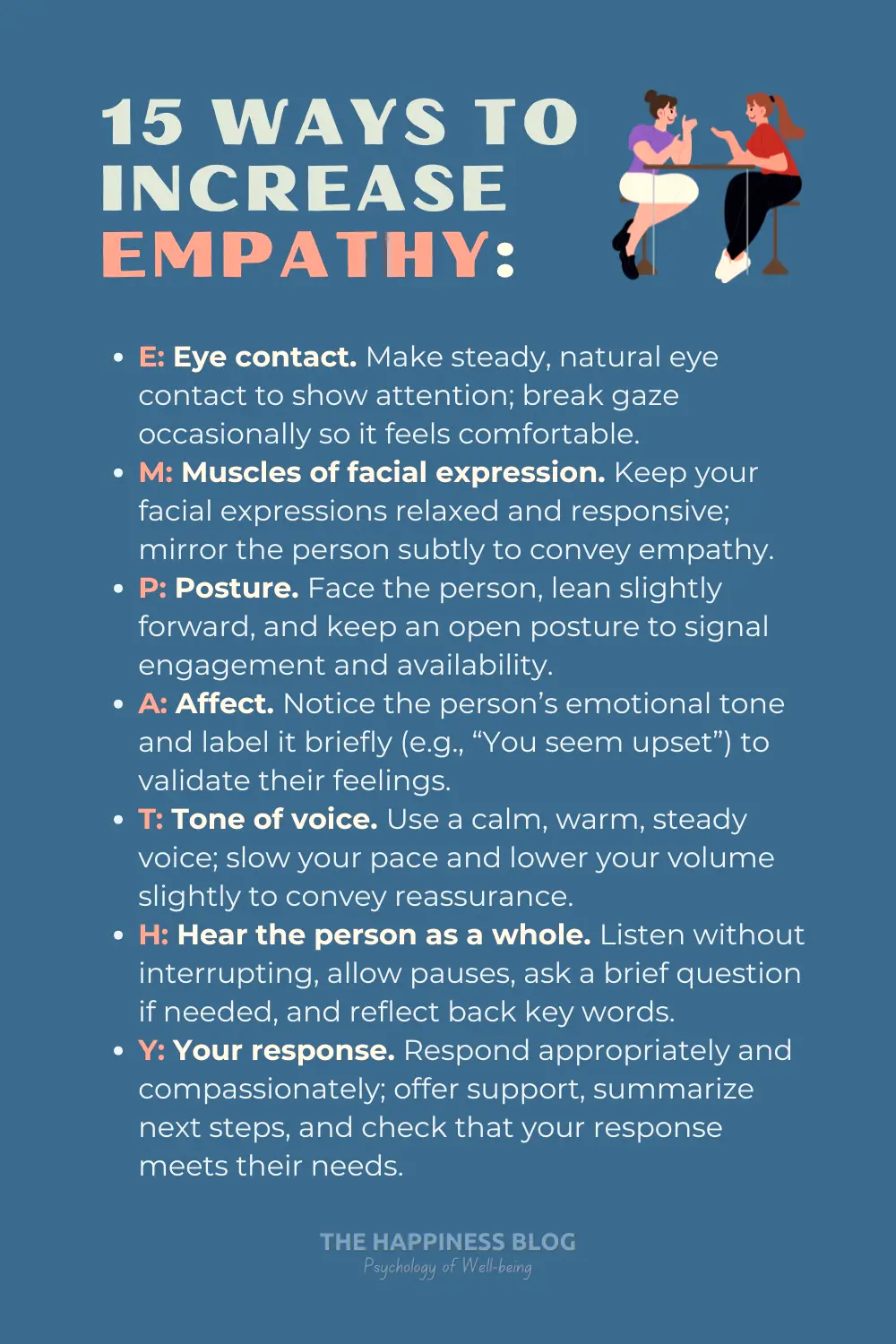Today's Saturday • 7 mins read
— By Dr. Sandip Roy.
Empathy increases your emotional intelligence. You can communicate and manage your feelings better. You can recognize and distance yourself from toxic relationships.
What you may not realize is that empathy is a skill rather than a fixed trait. Empathy can be taught and strengthened through intentional practice and education.
Teaching empathy to children from a young age helps reduce bullying and improve social skills. Studies show empathy training improves patient satisfaction and treatment compliance in doctors.
Empathy is the ability to recognize and understand another person’s emotional states and to feel a similar emotion to them.
- Cognitive empathy (CE) is the ability to recognize and understand the emotions and intentions of others.
- Affective empathy (AE) is actually feeling similar emotions to another person.
Both are necessary for responding with full empathy.
Here are 15 proven ways to help you increase your empathy and connect on a deeper level:
1. Don’t Oppose Their Emotions
They have every right to feel the way they want to. Don’t oppose or play down their emotions.
Acknowledge their feelings, even if you have a different way of expressing them. You don’t have to agree with them to empathize with their experiences and emotions.
2. Observe Nonverbal Cues
A lot of conversation is about the words left unsaid.
Pay attention to the unspoken emotional cues. Facial expressions, body language, and tone of voice may reveal more intimate insights into their emotions.
Helen Riess & Gordon Kraft-Todd (2014) devised a tool with the acronym “E.M.P.A.T.H.Y.”

- E: Eye contact. Make steady, natural eye contact to show attention; break gaze occasionally so it feels comfortable.
- M: Muscles of facial expression. Keep your facial expressions relaxed and responsive; mirror the person subtly to convey empathy.
- P: Posture. Face the person, lean slightly forward, and keep an open posture to signal engagement and availability.
- A: Affect. Notice the person’s emotional tone and label it briefly (e.g., “You seem upset”) to validate their feelings.
- T: Tone of voice. Use a calm, warm, steady voice; slow your pace and lower your volume slightly to convey reassurance.
- H: Hearing the person as a whole. Listen without interrupting, allow pauses, ask a brief clarifying question if needed, and reflect back key words to make sure you understood (e.g., “So you’re worried about the test results and feeling overwhelmed”).
- Y: Your response. Respond appropriately and compassionately; offer support, summarize next steps, and check that your response meets their needs.
This easy-to-remember checklist helped medical professionals at Massachusetts General Hospital orient to key aspects of perceiving and responding to nonverbal emotional cues.
3. Suspend Your Judgment
Don’t assume, don’t judge.
Listen to them with an open mind, setting aside your biases and prejudices. Don’t put them down as a person, even if what they say is wrong.

4. Consider Different Perspectives
Two people never see the same thing exactly. So, don’t assume the right to dictate how others should perceive the world. Instead, learn to see the situation as they see it, even if it’s not how you see it.
Ask them to share their opinions and feelings, even if you disagree. Make them feel safe enough to say what they think.
5. Practice Perspective-Taking Exercises
Taking the perspective of others is a proven way to help you empathize more.
Imagine yourself in the position of someone very different from your culture and society (e.g., as a member of the Maori people of New Zealand) to expand your view of diverse experiences.
By the way, do you think psychopaths can feel empathy?
6. Practice Active Listening
Give them the gift of your full attention. Look at them, not steal glances at your phone. Ask their permission before taking a call.
Learn to “disagree appropriately.” It creates a safe environment where people can share their differing perspectives.
Don’t just listen to respond. If you want to be an empathic friend, leader, or valued person in any relationship, learn the art of active listening.
7. Maintain Your Focus
Sometimes, even the most skilled listeners can lose focus when hearing things they don’t relate to or find interesting.
Just remind yourself to refocus whenever you realize your mind has wandered. Don’t feel stress or guilt.
Notice their expressions and micro-expressions to get back into the moment. Imagine their experience as they had it.
8. Ask Clarifying Questions
If you miss hearing or understanding what they said, ask them to repeat it. Don’t interrupt their flow. Ask for the parts you missed when they pause.
Be polite. Ask questions to open them up, not shut them down.
9. Inquire To Know, Not Suggest
Closed-ended questions impose limitations, whereas open-ended questions invite exploration and expression.
Ask to know their thoughts and emotions, not lock them into choosing an option.
- Close-ended question: “Did you enjoy the movie?”
- Open-ended question: “How did the movie make you feel?”
10. Dig Down (But Not Too Much)
Invite deeper conversation by creating a safe space.
Encourage them to talk about their difficult emotions, insights from their feelings and struggles, and how those things shaped them.
But don’t probe too much into their emotional world; it can stress you both. The goal is to connect and understand, not dig up every emotional layer.
11. Highlight Your Similarities
Shared experiences and emotions strengthen empathy. So, if you find some part of your own life resonating with their experience, tell them so.
Nevertheless, you can still feel empathy even if your experience is different from theirs.
12. Read Fiction and Watch Emotional Films
Storytellers know how to engage us with tales of human emotions and relationships.
A great way to learn how to be more empathetic is to get immersed in a story about someone else’s life, whether it’s real or made up.
Experiential learning, like reading fiction, travel, and even pet ownership, can broaden understanding of different experiences.
13. Cultivate Self-Awareness
Self-awareness is knowing who we truly are, how others view us, and how we fit into the world. The more self-aware people realize their unique talents and strengths, as well as their limitations.
When you are aware of your own emotions, you respond better to the emotions of others. So, learn to cultivate self-awareness.
14. Double-Check
Repeating back what you’ve heard can be a great way to make sure you understand them and are engaged in the conversation.
Don’t force your tone or timing, and go with the flow of the conversation.
Try “So, if I understand you correctly…” or “Just to make sure I’m on the same page…,” to keep it more like a friendly conversation and less like an interrogation or intrusion.
15. Volunteer or Help Others
Community service can expose you to various life experiences and expand your empathic ability.
For example, you could serve meals at a local soup kitchen, help out at an animal shelter, or spend time with seniors at a senior center.
Final Words
Finally, and I guess it’s already clear, empathy is a learnable skill.
Like any skill, empathy gets stronger the more you work at it. Pick a couple of these to start with, see how they feel, and gradually weave them into your daily interactions.
When you have the right amount of empathy, you can connect more deeply with the people who support you and figure out which relationships are toxic and need to end.
• • •
√ Also Read: Dangers of Empathy: 5 Ways Empathy Can Hurt You Bad
√ Please share it with someone if you found this helpful.
» You deserve happiness! Choosing therapy could be your best decision.
...
• Disclosure: Buying via our links earns us a small commission.
